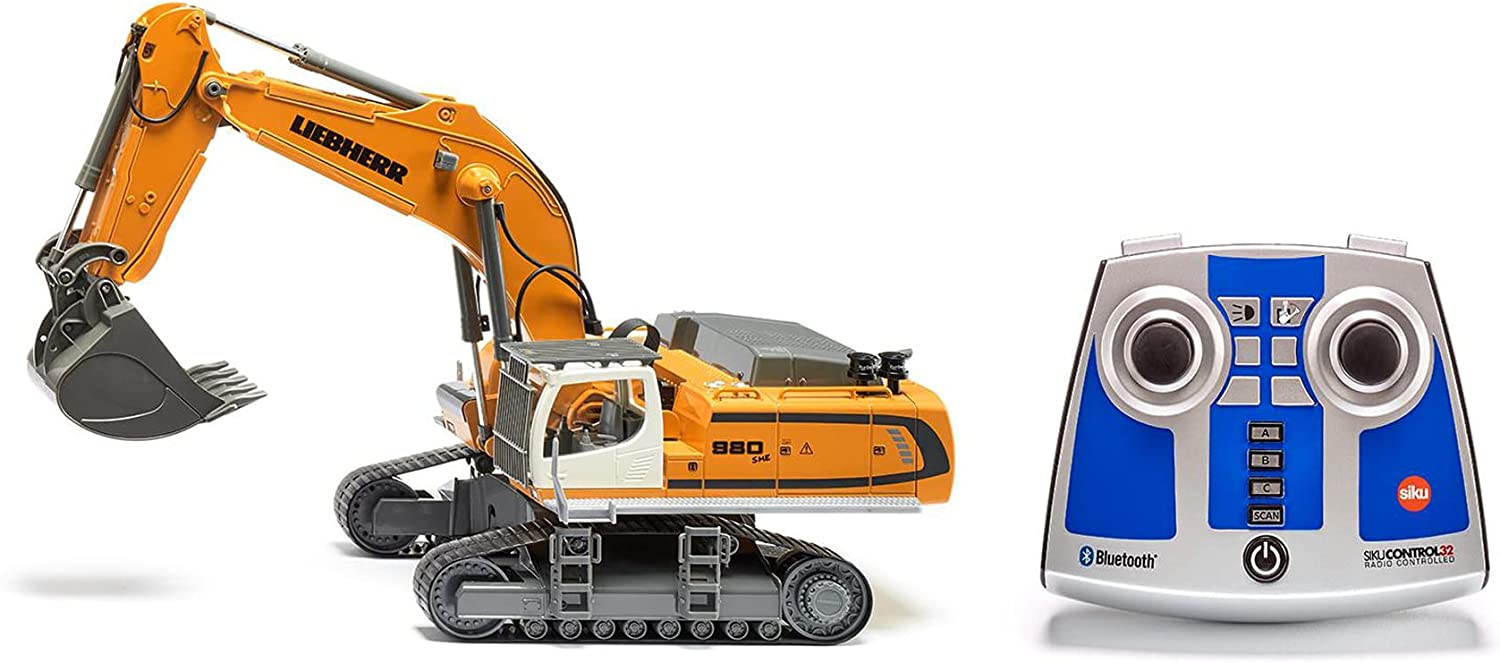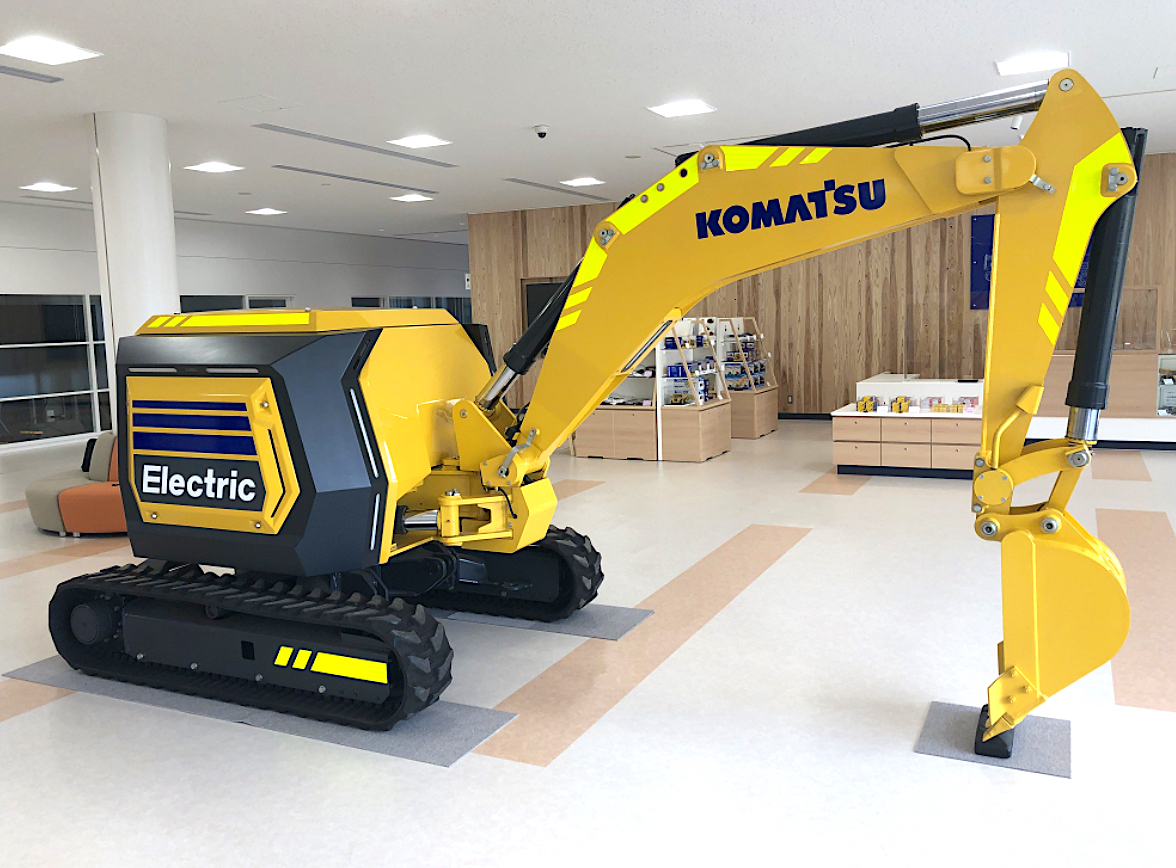The Top Benefits of Integrating a remote control excavator into Your Team
Wiki Article
Comprehending How Excavator Functions and Its Impact on Performance
Excavators play a necessary role in building and construction and mining operations, counting on a complicated interaction of mechanical and hydraulic systems. Their capacity to carry out a selection of tasks rests on both their style and the innovation integrated within. Recognizing these elements can considerably affect operational performance and productivity. As innovations remain to reshape the sector, one should think about how these changes will certainly affect future practices and performance.The Fundamentals of Excavator Mechanics

The Function of Hydraulic Solutions in Excavators
At the heart of excavator operation lies the hydraulic system, which plays an essential function in powering the maker's features and activities. This system makes use of pressurized hydraulic liquid to move power, making it possible for various actions such as excavating, training, and moving. By taking advantage of the concepts of hydraulics, excavators can execute tasks with exceptional accuracy and pressure, improving overall operational efficiency.The hydraulic system includes essential components, including cylinders, pumps, and shutoffs, which work with each other to manage the flow and direction of the liquid. When the operator engages the controls, the hydraulic liquid is guided to particular cylinders, converting the driver's commands into physical activity. This system permits receptive and smooth actions, which are important in construction and excavation settings. double e volvo rc excavator. The efficiency of the hydraulic system directly influences the efficiency and flexibility of the excavator, making it an essential element in contemporary excavation processesTrick Parts of an Excavator
Understanding the vital elements of an excavator is important for grasping just how this powerful equipment operates. An excavator is composed of numerous significant components, including the undercarriage, house, boom, bucket, and arm. The undercarriage supplies security and movement, often including wheels or tracks to navigate different surfaces. Your house has the engine and hydraulic systems, enabling the driver to control motion and power the equipment. The boom extends from your home, enabling vertical reach, while the arm attaches to the bucket, promoting digging and training operations.Additionally, the cab houses the operator, furnished with controls for precise handling. Each of these components plays a crucial role in the excavator's total functionality, adding to its efficiency and efficiency on building and construction sites. Recognizing these components assists in enhancing and keeping excavator performance, ensuring tasks are completed safely and efficiently.Accessory Adaptability and Its Advantages
Add-on convenience is a vital element of excavators, making it possible for drivers to switch over in between numerous devices customized for certain jobs. This flexibility not just improves task effectiveness however likewise contributes to cost-effectiveness by lowering the demand for several makers. Comprehending the various kinds of attachments available can greatly impact the total efficiency and capability of an excavator on work websites.Types of Attachments
While excavators are mainly recognized for their excavating capacities, their true adaptability depends on the vast range of add-ons offered. These accessories enhance the excavator's performance, permitting it to carry out numerous jobs beyond excavation. Common attachments consist of containers (for digging and scooping), hydraulic thumbs (for grasping products), and augers (for drilling openings) Grapples are used for relocating and dealing with particles, while rippers can damage up hard surface areas. Other specialized add-ons, such as plates and plows, make it possible for excavators to adapt to details task requirements. This variety not only raises the maker's utility throughout different fields, including construction, landscape design, and demolition, yet likewise permits operators to tailor their tools to meet certain project demands successfully.Enhanced Task Performance
Taking full advantage of work efficiency is a main benefit of using different excavator attachments. Different accessories permit an excavator to perform several jobs without requiring to switch devices, conserving important time and labor. For example, using a hydraulic hammer can damage concrete while a pail attachment can excavate soil, making it possible for a seamless workflow. This flexibility minimizes downtime related to devices adjustments and enhances efficiency on-site. Additionally, specialized attachments enhance accuracy in tasks such as grading or landscaping, bring about higher top quality outcomes. The capability to adjust to various task needs not just improves procedures but also lessens the need for extra equipment, making certain that tasks are completed quickly and properly. Overall, attachment flexibility significantly adds to enhanced task efficiency in excavation work.Cost-Effectiveness and Flexibility
Cost-effectiveness is a considerable benefit of making use of functional excavator accessories. These attachments enable a solitary excavator to carry out multiple jobs, decreasing the demand for extra machinery and labor - double e volvo rc excavator. By switching over in between buckets, hammers, and grapples, drivers can take on various jobs, from digging to demolition, thereby optimizing devices utilization. This flexibility not just lowers functional expenses but additionally reduces downtime related to transforming devices. Additionally, the capability to customize excavators with specialized add-ons improves performance, as they can effectively handle varied tasks according to task demands. To end, the combination of cost-effectiveness and versatility in excavator accessories contributes to boosted operational performance and resource allocation in building and construction and excavation projects
Advanced Modern Technology in Modern Excavators
Modern excavators are significantly furnished with sophisticated technology that changes excavation processes. Automation simplifies procedures, while improved gas effectiveness decreases functional expenses. Additionally, clever control systems enhance accuracy and security, marking a substantial development in excavation equipment.Automation in Excavation Processes
As excavation innovation develops, automation has actually become a critical element in enhancing performance and precision on work sites. Modern excavators are outfitted with sophisticated automated systems that facilitate tasks such as grading, excavating, and trenching with very little driver treatment. These systems utilize sensing units, GPS, and artificial intelligence algorithms to assure accurate placing and deepness control, significantly lowering the margin for error. Furthermore, automation allows drivers to concentrate on tactical decision-making instead of manual controls, causing improved efficiency on the whole. Such developments not just simplify workflows however additionally enhance security by lessening human mistake in complicated procedures. Subsequently, the integration of automation in excavation processes stands for a substantial advancement in building innovation, driving the market in the direction of greater effectiveness and efficiency.Enhanced Fuel Effectiveness
Improvements in innovation have actually additionally led to significant improvements in fuel efficiency for contemporary excavators. Modern makers are equipped with advanced engines that optimize power output while decreasing fuel usage. These engines use cutting-edge burning innovations, such as turbocharging and direct fuel shot, to improve efficiency and performance. Additionally, light-weight materials in construction minimize total weight, permitting less energy expenditure throughout procedure. The introduction of variable speed controls makes it possible for drivers to change engine performance according to details jobs, even more reducing fuel usage. Because of this, these enhancements not just lower operational prices however also add to environmental sustainability by reducing exhausts. Generally, enhanced gas effectiveness in excavators is a necessary advancement that bolsters performance and economic stability in the building industry.Smart Control Equipment
While drivers navigate significantly complex work sites, smart control systems in excavators have actually emerged as double e volvo rc excavator important devices for enhancing performance and precision. These innovative technologies make use of sensors and algorithms to keep an eye on various specifications such as load weight, terrain problems, and operational performance. By instantly adjusting hydraulic features, clever systems optimize maker performance, resulting in boosted productivity and minimized endure components. Furthermore, drivers take advantage of user-friendly user interfaces that provide real-time comments and diagnostics, enabling educated decision-making. This integration of innovation not just simplifies operations however likewise decreases human error, contributing to much safer workplace. As the building market remains to evolve, wise control systems will certainly play an essential duty in shaping the future of excavator effectiveness and efficiency.Enhancing Functional Performance With Excavators
Excavators play an important function in boosting functional efficiency across different building and excavation jobs. Their adaptability permits multiple tasks, including product, digging, and lifting handling, which streamlines operations and reduces the need for additional devices. With effective hydraulic systems, excavators can execute durable tasks with precision, significantly reducing the time required to full tasks. The combination of sophisticated innovation, such as GPS and automated controls, even more optimizes their procedure, making it possible for drivers to accomplish greater accuracy and reduce product waste. In addition, contemporary excavators are made to take in less fuel and lessen discharges, adding to both cost savings and ecological sustainability. By utilizing excavators effectively, building teams can enhance efficiency, fulfill job deadlines, and boost general website administration. This multifunctionality and efficiency make excavators indispensable devices in the contemporary building and construction landscape.The Future of Excavators in Building and Mining Industries
As the construction and mining sectors develop, the future of excavators is positioned for significant makeover driven by technological technology and altering functional demands. Breakthroughs in automation and expert system are reshaping excavator abilities, permitting improved accuracy and efficiency in procedures. Autonomous excavators are emerging, lowering the need for human treatment and decreasing the danger of accidents.Moreover, the assimilation of telematics and IoT technology allows real-time surveillance of device efficiency and anticipating maintenance, enhancing uptime. Green designs, consisting of electrical and hybrid versions, are gaining traction, lining up with sustainability objectives within the industry.Additionally, using sophisticated products and lighter layouts boosts fuel efficiency while preserving efficiency criteria. As these fads progress, excavators will play an important function in fulfilling the raising needs for productivity and safety in building and mining, eventually changing functional landscapes.Often Asked Inquiries
Exactly How Do Climate Condition Affect Excavator Efficiency?

Climate condition greatly affect excavator efficiency, as rain and mud can prevent grip and stability, while extreme temperature levels may affect hydraulic systems. Operators has to adjust to these variables to ensure perfect capability and security during procedures.
What Precaution Should Operators Follow While Utilizing Excavators?
Safety measures for excavator drivers include putting on proper personal safety equipment, performing pre-operation assessments, guaranteeing correct communication with ground employees, preserving a secure distance from overhanging dangers, and adhering to well-known operational methods to avoid crashes.Exactly How Often Should Excavators Be Preserved for Optimal Efficiency?
Excavators ought to be kept routinely to assure peak performance, usually every 250 operating hours or as defined by the producer. Regular checks boost reliability, stop unanticipated break downs, and prolong the lifespan of the devices.
What Is the Ordinary Lifespan of an Excavator?
The typical life-span of an excavator usually varies from 10,000 to 15,000 hours of procedure. Elements affecting long life include upkeep practices, operating problems, and the quality of the device itself, influencing total productivity and performance.
Can Excavators Operate Uneven Surface Effectively?
Excavators can operate effectively on irregular surface because of their articulated layouts and flexible tracks. These functions allow them to preserve stability and grip, enabling reliable operation in tough atmospheres frequently encountered in building and construction and landscaping projects. Each of these elements plays a vital role in the excavator's general capability, adding to its efficiency and efficiency on building websites. Maximizing task effectiveness is a key benefit of making use of various excavator attachments. While operators navigate significantly intricate job sites, smart control systems in excavators have emerged as vital devices for boosting performance and accuracy. Excavators play an essential role in enhancing operational efficiency across various construction and excavation projects. Advancements in automation and man-made intelligence are reshaping excavator capabilities, allowing for enhanced precision and efficiency in operations.Report this wiki page